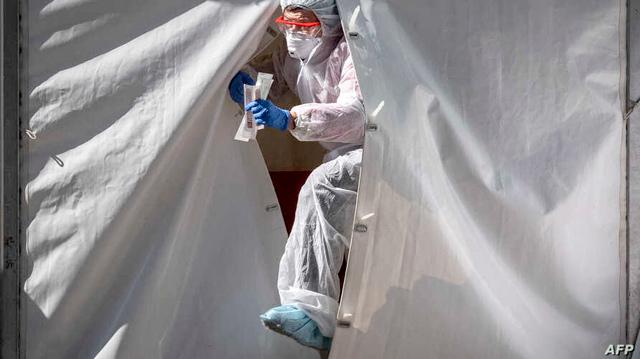- International News
- Thu-2021-06-10 | 01:47 pm

Russia on Wednesday reported a spike in coronavirus infections and announced special hospitals would reopen to treat an influx of patients as officials struggle to encourage Russians to get vaccinated.
A government tally Wednesday reported 10,407 new coronavirus infections across the country, the highest since March 14.
In Moscow, the epicentre of the outbreak in Russia, the surge in new infections saw the highest number of daily cases registered since January 16.
"The situation remains difficult. We're seeing a surge in infections day after day," Moscow Mayor Sergei Sobyanin said in televised remarks.
He added that around 10,000 hospital beds were occupied by coronavirus patients and that the city plans to open "several more" field hospitals in the coming days.
A member of the Moscow city government, Yevgeny Danchikov, said Wednesday the city will ramp up policing of mask wearing in public as the situation deteriorates.
Russia's second city Saint Petersburg, which is due to host several bouts of the postponed Euro 2020 football competition this month, has also recorded a spike in cases.
City authorities said earlier this week that infections were on the rise and announced a veterans' hospital was being repurposed to accommodate coronavirus patients.
Last week, the city also hosted the Saint Petersburg International Economic Forum, hailing it as one of the largest offline events in the world since the start of the pandemic.
According to its organisers, more than 13,500 participants from 141 countries took part in the event.
Russia has been among the countries hardest hit by the pandemic, with the sixth-highest number of cases in the world, according to an AFP tally.
But authorities have been accused of downplaying the severity of Russia’s outbreak by only counting fatalities where the coronavirus was found to be the primary cause of death after an autopsy.
Figures released by federal statistics agency Rosstat show that Russia had actually recorded some 270,000 virus-related deaths by the end of April — more than double the tally from the government’s daily announcements.
Russia imposed a strict lockdown when the pandemic first swept across the country last spring.
But authorities lifted most measures within several months, opting to protect the struggling economy and pinning their hopes on curbing the outbreak with vaccines.
Officials have registered four homegrown vaccines — Sputnik V, it’s single-dose version Sputnik Light, EpiVacCorona and CoviVac.
While Russia’s domestic vaccination campaign started in early December, ahead of most countries, so far only around 18 million Russians — or 12 per cent of the population — has received at least one dose of a vaccine. That compares with almost 50 per cent of the adult population in the EU.
President Vladimir Putin has repeatedly called on Russians to get immunised as authorities struggle to ramp up vaccination efforts.
According to a recent survey by the independent Levada-Centre, over 60 per cent of respondents said they do not intend to be vaccinated.
Independent sociologists say vaccine hesitancy is a sign of a breakdown in trust between Russians and the authorities after decades of Kremlin propaganda.













